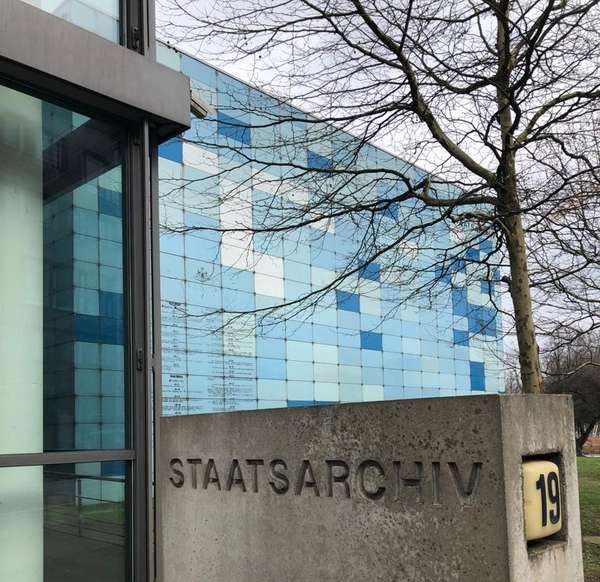To dare more archiving
- 20. February 2019 - Archives, Societies, Museums, General, Germany, Hamburg, Historical Documents
Archives and especially the preserved documents stored there are indispensable for genealogy. Hardly any research would be possible without them. However, they are not only relevant for family research, but function as information stores as well as places of commemorative culture.
Due to a lack of space and financial reasons, it is impossible to preserve everything. Every archive therefore has to appraise the offered collections and to make choices. Everything that is disposed leads to a loss of information. The question is how serious the loss is. Therefore, it is important to determine the archival value. In order to do so, among other things the source value and the epistemological value play a role. One problem is that appraisal might vary - due to different times and different persons/groups of persons - as perspectives and research interests are changing.
Sadly it happens that documents are disposed whose preservation would have been highly desirable.
In genealogy, we regularly discover that records that would have been very helpful for our exciting detective work are not preserved. This can be files on adoptions or legal proceedings or for example the so-called “Sammelakten” that usually accompanied every entry in German civil registers of births, marriages and deaths. Many archives do not take over those “Sammelakten” after the retention periods end; others make the choice to preserve only a selection, for example the “Sammelakten” of certain civil registry offices or years. For our work this is often very regrettable.
In Hamburg, an appraisal decision of the State Archive caused considerable trouble in 2018 (Amongst others, the Israeli daily newspaper Haaretz reported). But what happened? One million medical death certificates from the years 1876 to 1953 (about 45 linear meters) were irretrievably destroyed. The records were wrongly declared to be without additional value (you can find a statement of the State Archive Hamburg from 27 July 2018 here, explaining their decision). In fact, they contained important information on causes of death and especially the responsible doctors. They were not only but especially important for solving cases of euthanasia during National Socialism. Above all, the records were highly used and their destruction in hindsight also destroys the basis of the research they were used for.
On 19 February 2019, an interesting panel discussion by two institutions located in Hamburg, the Patriotische Gesellschaft (patriotic society) and the Verein für Hamburgische Geschichte (society for Hamburg History), took place. The title was “Geschredderte Geschichte. Wie gehen wir mit unserem historischen Erbe um?“ (Shredded history. How do we handle our historical heritage?). Apart from the head of State Archive Hamburg, Dr. Udo Schäfer, PD Dr. Kirsten Heinsohn (Forschungsstelle für Zeitgeschichte in Hamburg/Research Center for contemporary History in Hamburg), Prof. Dr. Dr. Rainer Hering (Landesarchiv Schleswig-Holstein/State Archive Schleswig-Holstein), Prof. Dr. Rainer Nicolaysen (University Hamburg and first chairman on the Verein für Hamburgische Geschichte) and Frauke Steinhäuser (historical educator, among other things very engaged in the Hamburg Stolperstein/stumbing stone project) were present.
All participants agreed that the destruction of the records should not have happened and that such a “catastrophe” should never be repeated. Even the State Archive Hamburg admitted in the meantime that the records would have been appraised differently by now (you can find their statement from 15 October 2018 here - unfortunately the document is only available in German).
But how could this happen and how is it possible to avoid similar mistakes in the future? Dr. Udo Schäfer admitted procedural errors. One step of the decision making process that probably would have stopped the destruction was skipped by mistake. Voices against the destruction were not heard or too late. Reportedly, the procedures will be improved in the future, control mechanisms will be implemented. Also, major decisions regarding destructions will be released publicly beforehand. Moreover, an external panel of experts was organized. It is supposed to advise the State Archive and assembles representatives of various historical institutions, among them the Genealogische Gesellschaft Hamburg (genealogical society Hamburg). How reasonable such an expert group is in the long-term remains to be seen.
Everyone agreed that subsequent destructions of records that were first taken over and may even have been used is highly unusual and should only happen, if absolutely necessary. Also, documents from the time of National Socialism in Germany should always be checked very closely before they are disposed and documents directly relating to euthanasia should never be destroyed.
The question of historical expert knowledge in archives and how it could be improved was raised as well. It was suggested by some that the State Archive Hamburg might consider doing research in their own records to a greater extent than lately.
Right at the beginning of the discussion, Prof. Dr. Dr. Rainer Hering talked about “mehr Archivierung wagen” (dare more archiving) following Willy Brand’s famous slogan “Mehr Demokratie wagen” (dare more democracy). How this might look like, we cannot really say after the discussion. However, the evening certainly made it clear that it is very important to question archival appraisal. Archives are the memories of our society and, like Prof. Dr. Dr. Hering further observed: Only what is archived, will be remembered.


0 comments